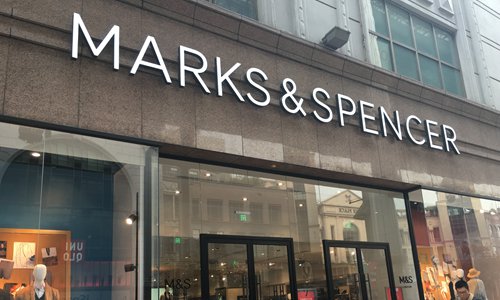Final sale as Marks & Spencer says it will shut all stores in the mainland
Consumers say styles, prices not what Chinese shoppers want

A Marks & Spencer store in Beijing Photo: Tu Lei/GT
UK-based retailer Marks & Spencer (M&S) announced on Wednesday that it will pull out of the Chinese mainland and close all 10 stores, which have been losing money, a move that experts said showed its lack of localization and intensified competition in the nation's apparel market.
"Our review has shown that our stores in the Chinese mainland continue to make losses and as a result we can no longer trade with a store presence in the Chinese market," Adam Colton, managing director of Greater China at M&S, was quoted as saying in a statement the company sent to the Global Times on Wednesday.
The company didn't disclose sales figures for its mainland stores.
An employee at the store at The Place shopping mall in Beijing's Chaoyang District told the Global Times on Wednesday that he felt sorry about the closure because business in Beijing was quite good and there were a lot of loyal customers. He did not know when his last day of work would be.
The 1,500-square meter Beijing store, which opened in December 2015, was the latest store outlet in the nation for M&S, which made its debut in Shanghai in 2008. The Beijing store was seen as a signal of M&S' strategic shift to China's first-tier cities. The company shuttered five shops in second-tier cities around Shanghai in August 2015 and said it "has learned some lessons from its other stores' underperformance in China," Wang Xinmiao, a Beijing-based retail industry analyst, told the Global Times on Wednesday.
However, such lessons didn't make the nearly 100-year-old UK retailer more appealing to Chinese consumers, either in terms of price or style, according to several Chinese consumers.
"The prices for items in their food hall, like sandwiches, beverages, donuts and chocolates, are a bit more expensive than even imported food stores," a 27-year-old Beijing-based white-collar worker surnamed Huang told the Global Times on Wednesday.
Another consumer surnamed Hou agreed. She complained that the clothes in M&S weren't stylish and offered mostly UK sizes. "Despite the good quality, I cannot find a suitable small size."
It seems like M&S has not been able to adapt itself to the Chinese market fast enough, according to a statement global strategy consulting firm OC&C Strategy sent to the Global Times on Wednesday.
"They could have further tailored the apparel products to Chinese body shapes and style preferences. Such localization is the key to unlock foreign markets," the statement said.
Competition in China's apparel market is also heating up, meaning that the UK retailer has been slowly losing favor in the traditional fashion segment, experts said.
International "fast fashion brands" such as Zara, H&M, GAP and Uniqlo entered the mainland market much earlier than M&S, and therefore, "the UK retailer did not have much time to cultivate brand awareness and a loyal customer base among Chinese consumers," Wang said.
In contrast, largely driven by its early entry in 1988, M&S has built up a profitable wholly owned business in Hong Kong, Cui Hongbo, analyst at Shanghai-based management consulting firm Zhengjian, told the Global Times on Wednesday.
The company is also planning to expand its business in Hong Kong by opening more food stores in the near future, according to the statement.
Similarly, in India, the iconic UK company will continue to expand its brand presence, mainly because of early market cultivation and demographic trends, Cui noted.
Also, the UK retailer has been losing ground in other international markets. The company plans to shutter 53 stores in 10 international markets, including seven in France, while pulling out of Belgium, Estonia, Hungary and Lithuania, the statement noted. Even in its own backyard, it will close 60 UK stores.
If M&S goes ahead with the retreat plans, it will incur non-underlying costs related to property and redundancy at around 150 million pounds ($198.26 million) to 200 million pounds, said the statement.
In the first half of 2016, the firm's pretax profit slumped 88 percent to 25.1 million pounds, the BBC said Wednesday.


